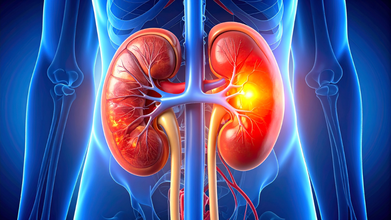- Health Conditions A-Z
- Health & Wellness
- Nutrition
- Fitness
- Health News
- Ayurveda
- Videos
- Medicine A-Z
- Parenting
Are Young Men Losing Hair Over Modern Lifestyle?

Image Credit: Canva
Have you noticed that there appear to be more young men struggling with receding hairlines and thinning hair? You're not seeing things. Studies indicate that balding is starting at a younger age than ever before, with men in their 20s and 30s being hit at alarming levels. A study conducted last year at Tsinghua University in Beijing discovered that almost 60% of young respondents said they experienced serious hair loss, with many not even realizing it until friends or relatives mentioned it. The trend is not exclusive to China—millennials across the globe are becoming more 'hair aware' as they realize their hairlines are receding earlier than earlier generations. But why is this occurring? Is contemporary life driving hair loss, or are there more profound biological and environmental forces at work?
Male pattern baldness (androgenetic alopecia) has traditionally been considered a genetic issue. If your grandfather or father lost their hair, it was likely that you would as well. But trichologists and scientists now claim that lifestyle factors are now an equally important influence.
One of the worst offenders is chronic inflammation—a state caused by unhealthy diet, stress, and toxins in the environment. A 2023 study found that high sugar intake raised the risk of premature hair loss. Men who regularly drank sugary soft drinks were three times more likely to develop pattern baldness than men who did not. Why? Sugar causes oxidative stress, leading to more free radicals in the body, which in turn inflames and damages hair follicles.
Are Stress and the Busy Lifestyle To Blame?
Stress has traditionally been known to be a cause of hair health. The typical hair growth cycle involves four phases: anagen (growth), catagen (transient), telogen (resting), and exogen (shedding). In the condition of long-term stress, more hair strands are forced into telogen stage earlier, thus causing excessive hair shedding—also referred to as telogen effluvium. Unlike male baldness, however, this condition is usually temporary but stressful.
The demands of contemporary life, especially for young professionals, involve high stress at the workplace, irregular timings, and pollution exposure. These conditions interrupt hormonal balance, decrease melatonin levels (a vital hormone for hair growth), and stimulate more production of dihydrotestosterone (DHT), a hormone that has a direct correlation with the shrinking of hair follicles.
Can Poor Nutrition Speed Up Balding?
Diet is vital to hair health, and numerous young men are unwittingly depriving their follicles of important nutrients. As vegan and vegetarian diets become increasingly popular, individuals may not be consuming sufficient amounts of vitamin D, zinc, iron, and protein, which are all necessary for healthy hair growth.
Zinc deficiency, among other factors, has been associated with higher levels of the enzyme 5-alpha reductase, which transforms testosterone into DHT—the major hormone involved in male pattern baldness. Although plant-based diets are healthy, one must be diligent in planning to provide optimal nutrient support for hair.
Influence of Media and Self-Perception
Millennials and Gen Z are coming of age in an environment where looks are more scrutinized than ever. Social media, celebrity culture, and high-definition screens have brought them to hypersensitivity about the way they look, including shifting hairlines. This added sensitivity could make them more aware of baldness earlier in life compared to past generations who may have not even observed it until very late in their lives.
A study at the University of Pennsylvania discovered that bald men tend to be viewed as more dominant, self-assured, and even taller than hairy men. Hollywood action heroes such as Dwayne 'The Rock' Johnson, Jason Statham, and Vin Diesel have come to accept baldness, showing that a receding hairline is not the end of a man's attractiveness. Nevertheless, for most young men, losing their hair before they feel 'old enough' to do so can be psychologically traumatic.
Treatments and Prevention: Is There Anything That Can Be Done?
The better news? Hair loss can be slowed down or even reversed by early treatment. Two of the most commonly prescribed FDA-approved drugs for male pattern baldness are finasteride and minoxidil:
Finasteride (Propecia) blocks the conversion of testosterone into DHT by inhibiting an enzyme, halting further shrinking of hair follicles. Clinical trials demonstrate that two-thirds of men notice improved scalp coverage with finasteride.
Minoxidil (Rogaine) is a topical treatment that actually causes hair to grow by enhancing the blood supply to hair follicles. It has been found that 62% of men notice significant improvements at 48 weeks.
In addition to medication, changes in lifestyle can also help achieve healthy hair. Proper exercise, stress management practices (like meditation or yoga), and a healthy balanced diet with plenty of vitamins and proteins can help drastically with hair retention.
German Study Shows Squirrels May Be Harboring Mpox Virus

Credit: Canva
Squirrels could be natural hosts of the mpox virus (MPXV) -- that causes monkeypox disease -- according to a recent study by German researchers.
The team from the Helmholtz Institute for One Health (HIOH) identified the fire-footed rope squirrel (Funisciurus pyrropus) as a likely natural reservoir of the MPXV.
The study published in the journal Nature revealed that sooty mangabeys – a primate found in West Africa -- can contract mpox by eating infected squirrels. The disease may present mild lesions, but it can also cause more severe skin lesions or even be fatal.
"Identifying the animal sources of the virus and the exposure routes that lead to inter-species transmission are key steps towards understanding spillover mechanisms and developing effective prevention measures to mitigate the risk of transmission to humans," said Livia V. Patrono, one of the senior authors at HIOH.
Squirrels Suspected MPXV Hosts
While squirrels have long been suspected as potential reservoirs for MPXV, their role was confirmed after an investigation of an mpox outbreak among wild sooty mangabeys (Cercocebus atys) in Côte d'Ivoire.
During the outbreak, reported in early 2023, nearly one-third of the primates showed clinical signs of disease, and four infants died.
The team conducted viral genome sequencing and found that the infected monkeys carried a virus that was nearly identical to an MPXV strain identified in a fire-footed rope squirrel found dead 12 weeks earlier nearby.
Further, the team analyzed fecal samples from the mangabeys. A sample collected eight weeks before the outbreak's onset contained DNA from both the virus and the rope squirrel. This provided strong evidence of interspecies transmission at that moment.
Sooty mangabeys have been previously observed catching and eating fire-footed rope squirrels, which provide a direct route for the transmission of viruses.
Mpox Continues To Spread Globally
Although mpox is no longer a public health emergency, outbreaks of clade I and clade II strains of the mpox virus are continuing in many countries around the world, especially in Africa.
Last week, Madagascar announced the country's first death from mpox, a 3-year-old girl from the island nation’s eastern city of Toamasina.
The WHO has also confirmed that two cases of the recombinant strain – combining genomic elements of clades Ib and IIb of the monkeypox virus (MPXV) – have been identified to date: one in the United Kingdom and one in India.
Mpox is an infectious disease caused by the monkeypox virus (MPXV), part of the Orthopoxvirus genus, which also includes the virus that causes smallpox.
It spreads through close physical contact, including sexual contact, and in some cases through contaminated materials or respiratory droplets.
Symptoms typically include fever, swollen lymph nodes, rash, and/or lesions.
The global health body has also urged all countries to “remain alert to the possibility of MPXV genetic recombination.” It has also urged for continued epidemiological surveillance, sequencing, vaccination of at-risk groups, and infection prevention and control measures.
This AI Tool Predicts Women’s Breast Cancer Risk Up to Four Years

Credit: Canva
An international group of scientists has created an artificial intelligence tool that can estimate a woman’s likelihood of developing breast cancer within the next four years.
The AI tool, known as the BRAIx risk score, analyzes mammogram images to generate an individualized risk assessment and flag women who may face a higher chance of developing the disease.
It may not only show the current risk but also predict the future risk, enabling early detection and treatments for a better outcome.
According to the findings published in The Lancet Digital Health journal, nearly one in 10 women ranked in the top 2 percent of risk by the AI tool were diagnosed with breast cancer within four years. This was despite previously receiving a clear screening result.
“These risk scores enable future development of personalized screening pathways to transform population breast cancer screening and save lives,” said corresponding author Helen M. L. Frazer of the University of Melbourne.
Frazer noted that identifying women who appear cancer-free but carry very high risk -- comparable to those with inherited BRCA1 or BRCA2 mutations -- will unravel both hereditary and non-hereditary causes of breast cancer.
From one-size-fits-all screening to personalization
Breast cancer screening programs have significantly lowered mortality rates -- by roughly 40-50 percent among women aged 50 to 74. However, most screening systems still apply the same approach to all women, regardless of individual risk.
Traditional screening tools use genetics, breast density, and questionnaires to estimate breast cancer risk. On the other hand, new AI-based screening tools, such as BRAIx personalizes screening by gathering information already present in breast scan images to better identify who is at higher risk.
“Our results show that conventional mammographic density is a far weaker predictor of breast cancer risk than the BRAIx risk score, even for interval cancers,” the researchers said in the paper. Interval cancers are aggressive tumors diagnosed after a negative mammogram.
The BRAIx Tool
The BRAIx risk score was developed using mammograms from nearly 400,000 women. To prove its efficacy, the AI tool was tested on data from almost 96,000 women from Australia and then confirmed in an independent Swedish population of over 4,500 women.
The findings showed that:
- The BRAIx risk score estimated breast cancer risk more accurately than the traditional risk factors, such as breast density, country of birth, and even family history.
- For the top 2 percent of women with the highest BRAIx risk score, the probability of a cancer diagnosis within 4 years was 9.7 percent -- a risk level exceeding that typically seen in women with inherited BRCA1 or BRCA2 mutations.
The BRAIx risk score can:
- Make breast screening more personalised,
- Improve early cancer detection,
- Reduce false alarms,
- Save lives without increasing costs
Global Breast Cancer Burden
Breast cancer continues to be the most common cancer among women worldwide.
A recent study published in The Lancet Oncology journal predicted that the number of new cases of the deadly disease will reach more than 3.5 million globally in 2050 -- rising by a third from 2.3 million in 2023.
Annual deaths from the disease will also rise by 44 percent -- from around 764,000 to 1.4 million.
However, not smoking, getting sufficient physical activity, lowering red meat consumption, and having a healthy weight can help prevent over a quarter of healthy years lost to illness and premature death from breast cancer.
COVID Survivors At Nearly Fivefold Risk Of Kidney Failure: Study

Credit: Canva
People who survived a COVID-19 infection can be at significant risk for kidney disease, acute kidney injury, and chronic kidney disease. compared to individuals who were not infected, according to a study.
The study, published online in the journal Communications Medicine, revealed that COVID patients have
- a 2.3-times higher risk of acute kidney injury
- a 1.4-times higher risk of chronic kidney disease
- a 4.7 times higher risk of kidney failure
“While we’re in the post-pandemic era, this shows that COVID-19 history is an important variable when considering the long-term impact of the infection on kidney function and disease,” said first author Yue Zhang, who was at Pennsylvania State University, US, while conducting the study. Zhang is currently a postdoctoral scholar at Johns Hopkins Bloomberg School of Public Health.
How Was The Study Conducted?
For the study, data on over 3 million working-age adults in the United States were analyzed.
The team compared the effect of influenza, another common viral infection that affects kidney health, and people with a history of COVID infection on kidney infections.
Using a machine learning model, the individuals were followed between 180 and 540 days for the emergence of new acute or sudden kidney disease.
The results showed that:
- Both COVID and the flu can worsen kidney health
- Flu caused a mild and temporary effect
- COVID increased the risk of acute kidney injury for a longer duration
- COVID survivors developed kidney disease within a few hours to a few days
- COVID patients had a longer-term chronic and end-stage kidney disease.
How COVID Worsens Kidneys Health
The Penn State researchers explained that kidney cells express high levels of the primary protein receptors that SARS-CoV-2 uses to enter and infect cells. Kidney cells also produce specialized enzymes that help viruses enter cells.
According to Kidney Health Australia, an acute COVID infection can impact the kidneys with fevers and respiratory symptoms, and/or worsening blood sugar control.
The US National Institutes of Health stated that renal dysfunction is an increasing clinical indicator of COVID propagation.
Citing several studies, the NIH said that the most common clinical manifestation is proteinuria -- found in more than half of the COVID patients. In addition, hematuria, elevated blood urea nitrogen, and elevated serum creatinine are other common features in Covid survivors with poor kidney health.
Nasr Ghahramani, Professor of Medicine at Penn State College of Medicine, stressed the need for COVID survivors, especially those with diabetes and high blood pressure, to take "more frequent and more prolonged monitoring of their kidney function" to enable early detection and better outcomes.
© 2024 Bennett, Coleman & Company Limited

